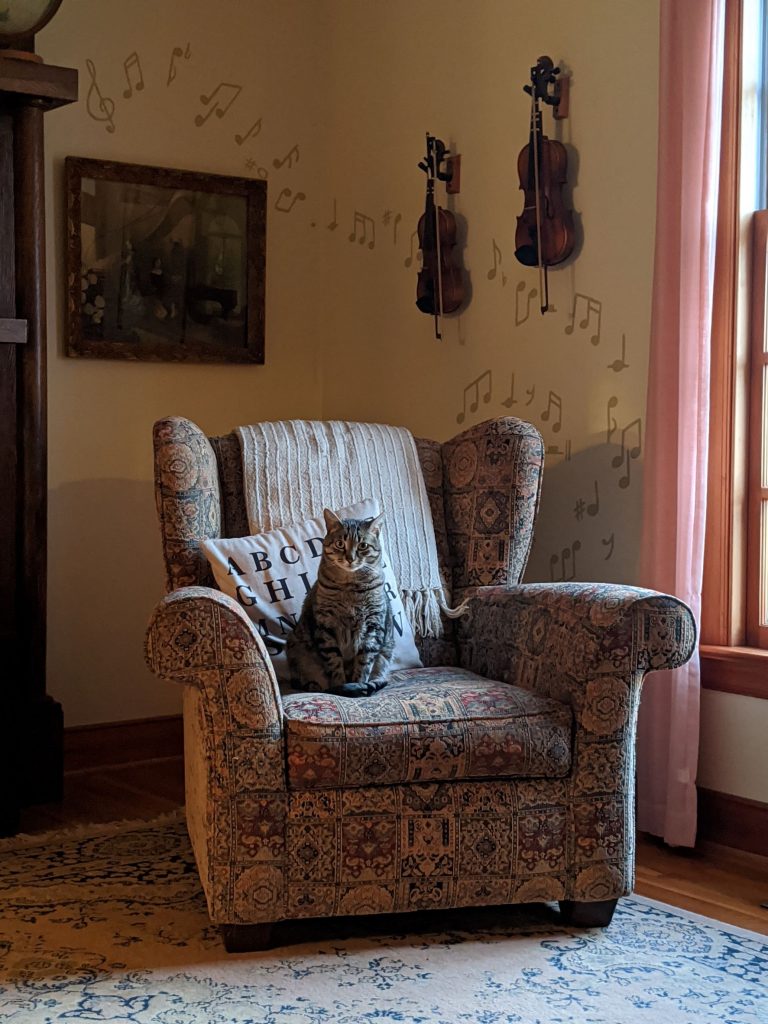Here is the street approaching twelve. High noon. The sun, encroaching upon the centre of the spring-slanted sky, casts a scathing glare. Its fierce eye scans the streets and skims the strutted homes. Finally, it fixes to the road. The shade trees withdraw their shade. The asphalt blisters beneath the sun.
Along this way, the street arrays its line of low-hedged lawns. The trees file some rough flanks. The silver gums stand guard against the heat, and the homes, for their part, lie flat, fat and defeated.
Of course, there are powerlines that sag and swing sadly in the windless air. There are the tidal sounds of car engines. The distant drone of planes. The mad shriek of a butcherbird bursts across the trees. And then the street bites down on its tongue. The bird cries die in the air. The day goes dead quiet.
On some other morning, you might have heard shouting from the playground; or the trembling crack of screen doors slamming shut; or the sound of a muffled domestic, moaning from the strutted awns across the road, but not now. Not with this noon closing in. There’s no sound at all save for the pale sedan making its slow way past your lawn.
You know this street. You have watched its businesswomen pass barefooted in the blue shade at dawn. You have seen its schoolchildren racing bikes in blurs of bright tees and blown-out thongs. You have glimpsed its husbands spending the small hours of the night in garden sheds by the light of furtive lamps. And you have caught your fellow layabouts pacing in the flat heat—the freaks, the shut-ins and the jawless retirees.
You sit before the shades and watch the traffic of that single sedan flash beneath the sun. You see turf grass standing in the stilled air. You listen for the rattle of your window frames.
Meteorologically speaking, very little has changed. The barometer hasn’t tricked or whirred. No pressure system’s shifted. And the temperature is exactly where you might expect it to be at this time of year. A gentle breeze briefly stirs your neighbour’s wind-chimes—your neighbour is one of those people who keeps wind-chimes—and today, perhaps to your surprise, its percussion carries past the walls, through the dining room and down towards the knot of your entrails.
Stop. Shake your head. Wash your hands with the scalding water and the scouring pad.
Perhaps, if you were closer with your neighbours, if you had made the effort to move past the awkward exchange of an odd or incidental remark. If you had acted on the letters for their town halls or accepted the invitations to their insulating social groups that gripe incessantly of plane routes and roving teens, then you might already know.
But you’ve seen Miss Doris Palmer. She’s the sad, crane-necked woman—the one you like to watch potter through the flat brick home behind your own. She caught something lurking in the shade of her eaves last night.
And then, there are the kids across the road, whom you’ve spotted spinning cartwheels through the grass at dusk. They claim they saw something crawling up to the peak of their neighbour’s gables last week.
Missing dog posters fight for the space of local streetlights. A pale sedan makes slow circles of suburban roads. The instances of dead air calls have experienced an unprecedented surge in both frequency and respiratory intensity. And there always seems to be someone swinging by the locksmiths now, hoping to replace a set of supposedly mislaid keys.
The floor joists crack their tenons. The air in here is dense. Brittle. The strain of shifting struts is becoming too much to sustain.
In the meantime, I must admit that I have been waiting for that moment when you note the soundless swing upon the door hinges. How I wish to see you searching for your missing keys, or scouring the garden for your hose, or gazing at the emptied slot for the carving knife in the block atop the counter.
You must admit that the life you are leading has begun to stagnate. For long stretches of daylight we find ourselves alone. The dust motes gather on the floor. The cloying must mutes the air.
Sometimes, you flick through the vacancy advertisements. You check your emails. You consider the beginnings of a hopeless CV. But the day is always oncoming. There are meals to be made, and there are all your regrets to be reconceived.
So take this time to comfort yourself in the hard-won knowledge of your objects. Sink your teeth into the lounge. Taste the pleather, the blend of foam, the pleasure of the rusted springs, and the stale perfume of the dead mutt.
Is this enough? Think about it. For just how long have you been stuck here grieving in the dark? Observe the slanted light. Its oblique angles. The way its leading lines your floor. No, you’ll need much more. Take to the blinds. Draw up the cords. Watch the daylight’s yellow gleam drip in.
Briefly then, I must confront your features. The creased composition of your skin. Its matted finish. And there’s that desperate, pressworked grimace…
Listen, let us return to the room. Enjoy its light and the vast array of items it reveals. We can begin with these punctures in your canvas prints. Then linger over the knife-gashed leather stretched across your lounge. Perhaps you should take up the hard weft of the rug and press its wet boot stain to your cheek. Delight in the soiled fibres of the carpet at your feet. Brush the newly lacerated surface of the desk. Stroke the dilapidated seat back of your chair. Prize the sideboard with the upended drawers, and then proceed to marvel at the matching dining table. Yes, it suits your buffet splendidly. Look at the wood grain, the colour, the accent lolling on its flank.
Perhaps you reunited them. They make for an exalted coupling upon the carpet there. Except now you notice a slight variation. There is the smallest alteration to their tint, a subtle visual incongruity that hints at two pasts, separate and distinct. Their unknown circumstantiation spreads out beyond your scope. And so you move towards your curtain rails in the hopes of spurring some collation.
The floorboards protest. Your steps begin to slow. I feel you press in beside me with your palms. I hear the curtain tracks drawing back their folds. And all of it stops. You drop the curtain before the sun can alight on the sideboard. You withdraw before your sight can affix me my shape. You leave the far side of the ruined room cloaked. You leave my curtain rail half-coiled.
And it takes everything within me to not stamp my feet and curse and repeat mad cursing your name and screaming, ‘Look at me! Look at me! What do you see? For I have been dropped into a world of unnamed beasts, all blind-eyed, all snapping their jaws like some family of flesh-blooded moles!’
Perhaps even that would be useless. Your attention returns to the road and rises towards the vertex of the sky. Soon, its eye will reach for the meridian. And still, there is time. The monad parses the street at its own implacable pace. And I will wait here with you for as long as it takes, stuck behind the hardened curb and its slack-jawed mail slot, safe in the knowledge that something must take shape.
Timothy Smith is a writer and artist living on unceded Yagara and Turrbal lands. He writes pleasant, straightforward fiction. His work has been highly commended for the 2022 Future Leaders Prize.







